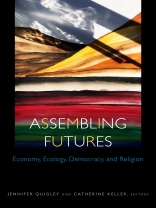Transdisciplinary insights at the intersection of religion, democracy, ecology, and economy
What is the relationship of religion to economy, ecology, and democracy? In our fraught moment, what critical questions of religion may help to assembly democratic processes, ecosystems, and economic structures differently? What possible futures might emerge from transdisciplinary work across these traditionally siloed scholarly areas of interest?
The essays in Assembling Futures reflect scholarly conversations among historians, political scientists, theologians, biblical studies scholars, and scholars of religion that transgress disciplinary boundaries to consider urgent matters expressive of the values, practices, and questions that shape human existence. Each essay recognizes urgent imbrications of the global economy, multinational politics, and the materiality of ecological entanglements in assembling still possible futures for the earth. Precisely in their diversity of disciplinary starting points and ethical styles, the essays that follow enact their intersectional forcefield even more vibrantly.
Inhaltsverzeichnis
Introduction
Jennifer Quigley and Catherine Keller 1
Our Place on Earth: Territory, Property, and the Sources of Human Entitlement
Paulina Ochoa Espejo | 7
Democratic Socialism in the USA: History, Politics, Religion, and Theory
Gary Dorrien | 26
Regifting the Divine Economy: Transitioning Petroleum-Based Energy Regimes
Marion Grau | 46
The Immanence and Transcendence of Christianity, Capitalism, and
Economic Democracy: Alternatives to Ecological Devastation
Joerg Rieger | 64
Sacred Obligations: On the Theopolitics of Debt and Sovereignty
Devin Singh | 83
Curating Futures: The Curatorial as a Theological Concept
Daniel A. Siedell | 106
The Costs of Citizenship: Politeuma in the Letter to the Philippians
Jennifer Quigley | 127
Ambiguous, Amorous, Agonistic, Not Able:
An Alternative to Adamant, Apathetic, Antagonistic, Able Society
Eunchul Jung | 142
What Does Evolutionary Biology Tell Us about Relationality as a Basis for Economics and Politics?
Marcia Pally | 162
In Whose Interest? Matthew 25:14–30 as a Theo-Economic Parable Hard at Work
Hilary Mc Kane | 183
Creeps of the Apocalypse: Climate, Capital, Democracy
Catherine Keller | 201
List of Contributors | 219
Index | 223
Über den Autor
Jennifer Quigley is Assistant Professor of New Testament at Candler School of Theology at Emory University. Her research lies at the intersections of theology and economics in New Testament and early Christian texts. She has interests in archaeology and material culture, and her research and teaching are influenced by feminist and materialist approaches to the study of religion. She is the author of Divine Accounting: Theo Economics in Early Christianity.







![Cover von Brian Schrag & Julisa Rowe: Community Arts for God's Purposes [Chinese] 貼近神心意的社群藝術 Cover von Brian Schrag & Julisa Rowe: Community Arts for God's Purposes [Chinese] 貼近神心意的社群藝術](https://static.worldofdigitals.com/thumb_webp/740/9781645083740.webp)




